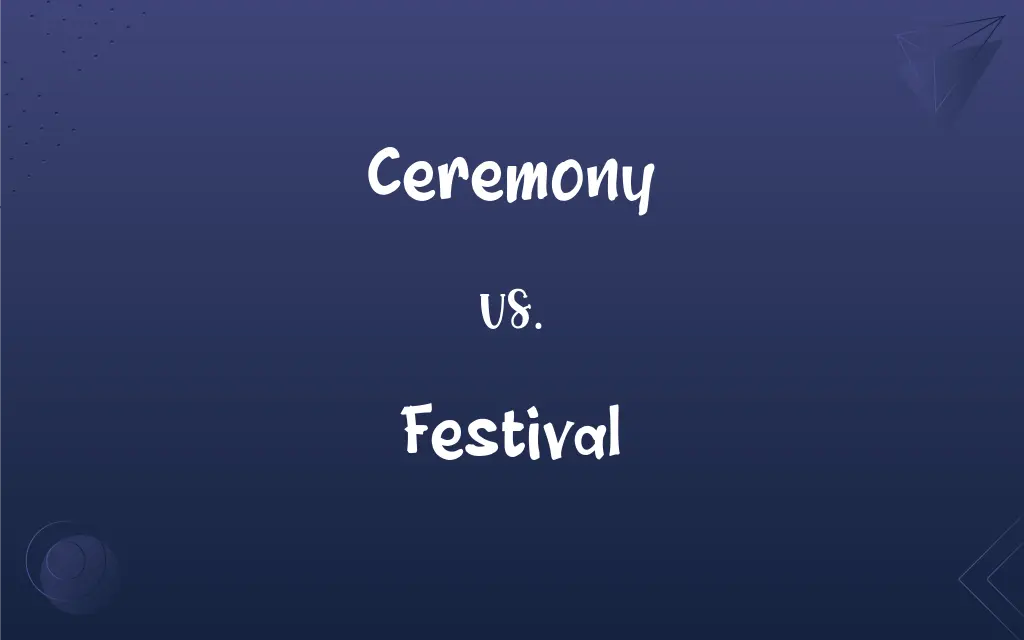Ceremony vs. Festival: What's the Difference?
Edited by Aimie Carlson || By Janet White || Updated on September 26, 2023
A ceremony is a formal act or set of acts performed as prescribed by ritual or custom, while a festival is a day or period of celebration, often for religious reasons.

Key Differences
Ceremony and Festival are both terms representing forms of collective activities, but they diverge significantly in their essence and scope. A ceremony is generally a formal, ritualistic event often marked by traditions and specific protocols. It usually holds a symbolic significance and is performed on special occasions, such as weddings or award ceremonies, to give formal recognition or to honor specific achievements, transitions, or occasions. In contrast, a festival is a broader term depicting a day or period dedicated to the celebration, feasting, or commemoration, often with a religious or cultural significance, like a harvest festival, and it usually includes various activities, entertainments, and communal participations.
The concept of ceremony inherently is more structured and solemn, often marked by a sense of reverence or respect, with the participants observing formal protocols and etiquettes, like a graduation ceremony. Conversely, a festival emphasizes joy, entertainment, and celebration, often marked by an atmosphere of jubilance and a variety of activities, and it may span across several days, bringing people together in celebration of a common theme or occasion, such as a music festival.
Ceremony and festival also vary in their purpose and intent. A ceremony typically aims to confer legitimacy, honor, or recognition and is usually characterized by deliberateness and formality in its conduct. It often symbolizes transitions, achievements, or commemorations, like a coronation ceremony. In contrast, the primary intent of a festival is celebration and enjoyment, often rooted in cultural, religious, or seasonal themes, and it brings communities together to share in joy, traditions, and mutual experiences, like a food festival.
The accessibility and participation in ceremonies and festivals also differ. A ceremony might be private, with limited and specific attendees, like a baptism ceremony, where invitations might be necessary. On the other hand, festivals are usually public celebrations, open to wide and diverse participation, encouraging community engagement and shared experiences, like a street festival, which is generally open to everyone.
While the atmosphere of a ceremony is usually more formal and reverent, emphasizing decorum and tradition, a festival, on the other hand, is usually more informal and lively, marked by vibrancy, enjoyment, and a communal spirit, allowing a wider array of activities and engagements, like dance and music performances, games, and food, making it a more inclusive and diverse form of celebration.
ADVERTISEMENT
Comparison Chart
Nature
Formal, structured, and ritualistic.
Informal, celebratory, and diverse.
Purpose
To honor, recognize, or commemorate specific occasions.
To celebrate, entertain, and bring communities together.
Duration and Scope
Usually shorter and more specific.
Can be longer and more varied.
Participation
Can be private and exclusive.
Generally public and inclusive.
Atmosphere
Solemn, reverent, and formal.
Joyful, lively, and informal.
ADVERTISEMENT
Ceremony and Festival Definitions
Ceremony
Ceremony also denotes an established system of rites or formal actions connected with an occasion, place, or set of beliefs.
The tea ceremony is steeped in tradition.
Festival
Festival refers to a time of year when people have a holiday from work and celebrate some special occasion.
The spring festival marks the beginning of a new agricultural year.
Ceremony
Ceremony is a formal event marking a special occasion.
The graduation ceremony was filled with joy and pride.
Festival
Festival denotes a joyful, communal celebration, usually marked by entertainment, activities, and food.
The harvest festival brought the whole village together.
Ceremony
Ceremony can refer to polite or formal behavior.
He greeted her with all the proper ceremony.
Festival
Festival can also mean a program of events, or all the performances, movies, etc. that are part of an organized occasion.
The film festival featured several award-winning documentaries.
Ceremony
Ceremony refers to a formal act or series of acts prescribed by ritual, protocol, or convention.
The opening ceremony of the Olympics is always a spectacular event.
Festival
An occasion for feasting or celebration, especially a day or time of religious significance that recurs at regular intervals.
Ceremony
A formal act or set of acts performed as prescribed by ritual or custom
A wedding ceremony.
The Japanese tea ceremony.
Festival
An often regularly recurring program of cultural performances, exhibitions, or competitions
A film festival.
Ceremony
A conventional social gesture or act of courtesy
The ceremony of shaking hands when introduced.
Festival
Revelry; conviviality.
Ceremony
A formal act without intrinsic purpose; an empty form
Ignored the ceremony of asking for comments from other committee members.
Festival
Of, relating to, or suitable for a feast or festival; festive.
Ceremony
Strict observance of formalities or etiquette
The head of state was welcomed with full ceremony.
Festival
Pertaining to a feast or feast day; festive. Now only as the noun used attributively.
Ceremony
A ritual, with religious or cultural significance.
Festival
(Bible) A feast or feast day.
Ceremony
An official gathering to celebrate, commemorate, or otherwise mark some event.
A graduation ceremony, an opening ceremony
Festival
An event or series of special events centred on the celebration or promotion of some theme or aspect of the community, often held at regular intervals.
The Reading and Leeds festivals take place on the August bank holiday.
A Welsh eisteddfod is a literary festival.
Ceremony
(uncountable) A formal socially established behaviour, often in relation to people of different ranks; formality.
Festival
In mythology, a set of celebrations in the honour of a god.
Ceremony
(uncountable) Show of magnificence, display, ostentation.
Festival
Fried cornbread.
Ceremony
(obsolete) An accessory or object associated with a ritual.
Festival
Pertaining to a fest; festive; festal; appropriate to a festival; joyous; mirthful.
I cannot woo in festival terms.
Ceremony
(obsolete) An omen or portent.
Festival
A day or period of time set aside for feasting and celebration
Ceremony
Ar act or series of acts, often of a symbolical character, prescribed by law, custom, or authority, in the conduct of important matters, as in the performance of religious duties, the transaction of affairs of state, and the celebration of notable events; as, the ceremony of crowning a sovereign; the ceremonies observed in consecrating a church; marriage and baptismal ceremonies.
According to all the rites of it, and according to all the ceremonies thereof shall ye keep it [the Passover].
Bring her up the high altar, that she mayThe sacred ceremonies there partake.
[The heralds] with awful ceremonyAnd trumpet's sound, throughout the host proclaimA solemn council.
Festival
An organized series of acts and performances (usually in one place);
A drama festival
Ceremony
Behavior regulated by strict etiquette; a formal method of performing acts of civility; forms of civility prescribed by custom or authority.
Ceremony was but devised at firstTo set a gloss on . . . hollow welcomes . . . But where there is true friendship there needs none.
Al ceremonies are in themselves very silly things; but yet a man of the world should know them.
Festival
Festival is a day or period of celebration for a religious or cultural event.
The city hosts a film festival every fall.
Ceremony
A ceremonial symbols; an emblem, as a crown, scepter, garland, etc.
Disrobe the images,If you find them decked with ceremonies. . . . Let no imagesBe hung with Cæsar's trophies.
Festival
Festival is an organized series of events such as musical concerts or drama productions.
The jazz festival attracted musicians from around the world.
Ceremony
A sign or prodigy; a portent.
Cæsar, I never stood on ceremonies,Yet, now they fright me.
Ceremony
A formal event performed on a special occasion;
A ceremony commemorating Pearl Harbor
Ceremony
Any activity that is performed in an especially solemn elaborate or formal way;
The ceremony of smelling the cork and tasting the wine
He makes a ceremony of addressing his golf ball
He disposed of it without ceremony
Ceremony
The proper or conventional behavior on some solemn occasion;
An inaugural ceremony
Ceremony
Ceremony is a set of formal activities conducted on some solemn or important public or state occasion.
The inauguration ceremony symbolized a new beginning for the country.
FAQs
Can a festival be a ceremony?
A festival can include ceremonies, but they are not synonymous; festivals are typically larger celebrations with multiple activities, while a ceremony is a set of formal actions.
Is a ceremony always formal?
While ceremonies often have formal elements, they can also be informal, depending on the cultural or personal context.
Are ceremonies always religious?
No, ceremonies can be secular or religious, and can mark milestones, achievements, or transitions.
Do festivals always last multiple days?
While many festivals last multiple days, some are only one-day events.
Is attendance mandatory at ceremonies?
Attendance is not universally mandatory and depends on the type of ceremony and cultural, familial, or organizational expectations.
Can anyone organize a festival?
Yes, festivals can be organized by individuals, communities, organizations, or governments.
Is a ceremony always a solemn event?
No, ceremonies can be solemn or joyous, depending on their purpose and the cultural context in which they occur.
Can a ceremony be part of a festival?
Yes, ceremonies often occur within the larger celebration or observance of a festival.
Do all ceremonies have a ritualistic aspect?
Many ceremonies involve rituals, but the level of ritualism can vary widely depending on the purpose and context of the ceremony.
Are festivals always public events?
While many festivals are public, some are private events, accessible only to certain communities or groups.
Do all ceremonies involve spoken words or speeches?
While many ceremonies involve spoken elements, some may focus more on actions, music, or other forms of expression.
Can festivals be held to honor individuals?
Yes, some festivals are held to honor individuals, such as saints, historical figures, or cultural icons.
Can ceremonies be spontaneous?
While ceremonies are typically planned events, spontaneous ceremonies can occur, often in response to unexpected events or developments.
Are food and drink essential to every festival?
While food and drink are common features of festivals, they are not essential to every festival.
Is a festival always a celebration?
Most festivals are celebratory in nature, but some commemorate solemn or reflective occasions.
About Author
Written by
Janet WhiteJanet White has been an esteemed writer and blogger for Difference Wiki. Holding a Master's degree in Science and Medical Journalism from the prestigious Boston University, she has consistently demonstrated her expertise and passion for her field. When she's not immersed in her work, Janet relishes her time exercising, delving into a good book, and cherishing moments with friends and family.
Edited by
Aimie CarlsonAimie Carlson, holding a master's degree in English literature, is a fervent English language enthusiast. She lends her writing talents to Difference Wiki, a prominent website that specializes in comparisons, offering readers insightful analyses that both captivate and inform.































































